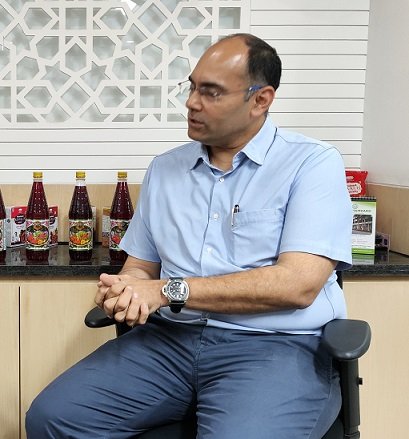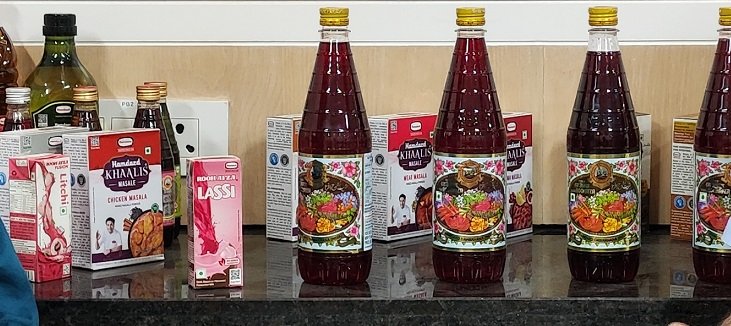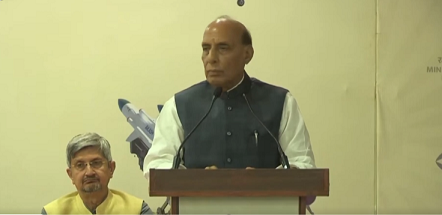Last Updated on April 22, 2025 9:43 am by BIZNAMA NEWS
“You’ll find Rooh Afza in mosques during Ramzan, temples during Navratri, and gurdwaras on hot summer days. It’s not just a drink — it’s a tradition.”
By Andalib Akhter
In what could be the most unexpected summer showdown, yoga guru and Patanjali co-founder Baba Ramdev stirred up controversy by accusing the iconic drink Rooh Afza of launching a so-called Sharbat Jihad.” Yes, you read that right — a syrup war.

During a wellness summit in Haridwar, Ramdev, known more for his political spice than culinary taste, called the century-old drink a tool of some sinister “agenda.” Holding up a tumbler of the rose-red syrup in a Patanjali product demo, he warned, “This isn’t just syrup. It’s Sharbat Jihad!”
The internet, naturally, exploded.
#SharbatJihad began trending, with users tweeting everything from mock conspiracy theories (“I added Rooh Afza to milk — am I now in syrup sleeper cell?”) to satirical product ideas (“Patanjali’s Swadeshi Sharbati Sanjeevani – fight back with flavor!”). Street vendors, too, joined in on the fun. “If this is jihad, I’ve been fighting the heat with it for 20 years,” said Ram Kumar, a juice seller in Delhi.
But amid the memes and mockery, Hamdard Foods India took the high road. And with it, issued a classic clapback — in style. “Come for Sharbat, Stay for the Truth”
In an interview to Biznama , Hamid Ahmed, CEO of Hamdard Foods India and great-grandson of the legendary Hakeem Abdul Majeed, called out Ramdev’s allegations as “baseless, communal, and absurd.”
“Rather than dividing people, Rooh Afza unites them. We cordially invite Baba Ramdev to our factory — for sharbat and a glass of truth,” said Ahmed with a calm smile.
He pointed out that 85% of Hamdard’s profits go to charity**, funding education, healthcare, and skill development across India. “We didn’t create this controversy. We’re too busy sweetening lives,” he added.
From the Alley to the Nation
Tracing Hamdard’s legacy from a small Unani clinic in 1906 to a nationwide brand, Ahmed reminded us of Rooh Afza’s universal appeal — across homes, faiths, and festivals.
“You’ll find Rooh Afza in mosques during Ramzan, temples during Navratri, and gurdwaras on hot summer days. It’s not just a drink — it’s a tradition.”
When asked about allegations of money being funneled to Pakistan, Ahmed was direct: “That’s fiction. We operate entirely independently. Our profits go to Hamdard National Foundation, not across borders.”
On whether Rooh Afza discriminates in employment, his answer was firm: “Absolutely not. We hire on merit, not on religion. Visit any of our offices and see for yourself.”
Did the Controversy Impact Sales? Actually, no — quite the opposite. “Our sales saw a boost. Even those who never bought Rooh Afza started picking it up in solidarity. The people of India know what Rooh Afza stands for,” said Ahmed.
The Future Is Sweet (and Sugar-Free)
With growing health concerns, Ahmed announced the launch of Rooh Afza LITE — a sugar-free version made with maltitol. It took a decade of R&D and is now flying off shelves.
And it doesn’t stop there. Hamdard has expanded into *spices, honey, vermicelli, edible oils*, and even **lassi and milkshake blends** — all under the guidance of consultants like Deloitte.
Trust Over Trolls
Ahmed reiterated that Hamdard is a trust, not a waqf, focusing solely on secular charitable work — a fact upheld by the Delhi High Court. “We don’t respond to trolls with rage. We respond with results — and Rooh Afza,” he quipped.
Final SipAs Ramdev brews controversy with syrup conspiracies, Hamdard serves a century-old reminder — that some drinks don’t just quench thirst, they ‘build bridges’.
And as for ‘Sharbat Jihad’? Looks like India’s just found its new favorite hashtag to toast to.




